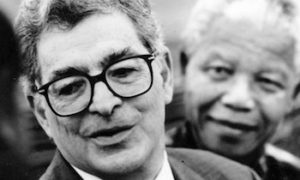
Arthur Chaskalson
*Arthur Chaskalson was born on this date in 1931. He was a white Jewish-South African lawyer, judge, and activist.
Born in Johannesburg, he came from a modest background; his father was a Lithuanian immigrant who died when he was five. His mother sent him to two elite private schools, Pridwin and Hilton, despite their tight finances.
In 1954, he graduated with a law degree cum laude from the University of the Witwatersrand (Wits). He excelled at soccer, playing for Wits and the combined South African university team. Chaskalson passed the Johannesburg Bar in 1956. Chaskalson was influential in legally challenging Apartheid.
In 1960, he and his wife Lorraine were married. She was a poet and lecturer; they had two sons, Matthew and Jerome. In 1963, he joined the defense team for the Rivonia Trial, in which Nelson Mandela was given life imprisonment rather than the death penalty. He earned the rank of senior counsel in July 1971. In 1979, Chaskalson left what was said to have been a lucrative private practice and founded the Legal Resources Center, a non-profit organization that worked against Apartheid. He served as director until September 1993.
The Center continues to pursue justice and human rights across South Africa today. In 1975 and 1983, he was the leading counsel in the Komani and Rikhotso cases. Those cases successfully challenged the legality of influx control legislation, which forced South Africa's black citizens to carry passes and to live in artificial, rural areas called Bantustans, the so-called Bantu Urban Areas Act. The Komani and Rikhotso cases were instrumental in crippling the government's ability to enforce influx control.
Chaskalson played a central role in drafting and negotiating the Interim Constitution, which established a bill of rights for the people of South Africa and served as that country's constitution from 1994 to 1997. In June 1994, Nelson Mandela, the first president of South Africa’s new constitutional court, appointed him. From 2004 to 2008, he served as president of the International Commission of Jurists.
Chaskalson was occasionally criticized for acting soft on the post-Mandela African National Congress, which was accused of infringing on judiciary independence. However three weeks before his death, Chaskalson delivered a lecture to the Cape Law Society in Kimberley about the Legal Practice Bill, which the Jacob Zuma government intended to make law. He called the legal profession to do its "duty" by speaking out against measures threatening the courts' independence.
He will be remembered as one of South Africa's constitutional and human rights jurists. On May 31, 2005, shortly after he retired as chief justice, Chaskalson was praised by former President Thabo Mbeki, who called him a great son of the South African people and a giant among the architects of that nation's democracy. Mbeki thanked Chaskalson for his role as a lawyer, judge, and South African in shepherding the nation into a place where all citizens belong.
Arthur Chaskalson, one of South Africa's legal giants and an anti-apartheid hero, died on December 1, 2012, after a struggle with leukemia. He was 81. He was buried at the West Park Jewish Cemetery in Johannesburg. President Jacob G. Zuma, Minister of Justice Jeff Radebe, Housing Minister Tokyo Sexwale, and Chief Justice Mogoeng Mogoeng attended his funeral. Among the pallbearers were former Chief Justice Pius Langa; Deputy Chief Justice Dikgang Moseneke; Governor of the South Africa Reserve Bank Gill Marcus; Cyril Ramaphosa, who played a crucial role in helping steer the country toward its first democratic elections in April 1994; and Zwelinzima Vavi, General-Secretary of Cosatu (Congress of South Africa Trade Unions).
Jeremy Gauntlett, chairman of the South Africa Bar Association, wrote of his colleague. "Diffident and private, always embarrassed when he was made the focus of attention regarding human rights work, Chaskalson was reluctant to explain quite why he took that path. He led a new generation of lawyers who, through the courts, forced spaces between the flagstones of oppressive legislation. In a time of great legal creativity, he inspired many by his courage and example."
Although Zuma declared the funeral a state affair, the Chaskalson family asked that Geoff Budlender, who co-founded the Legal Resources Center with Chaskalson in 1979, deliver the only eulogy. Two days after the funeral, on December 5, a state memorial was held at the Johannesburg City Hall.